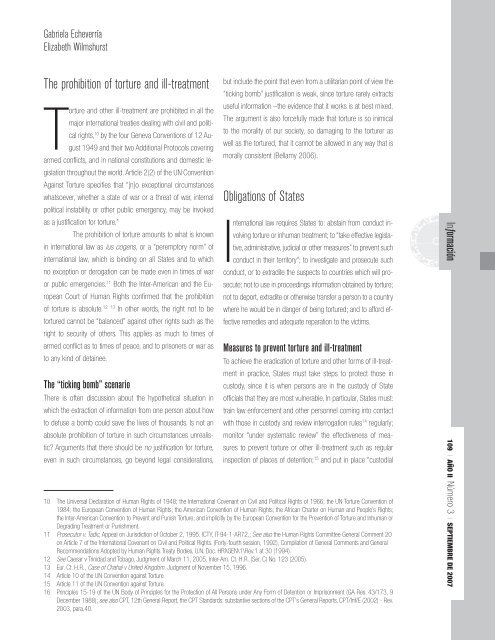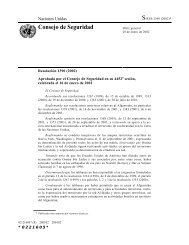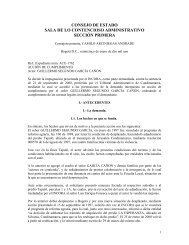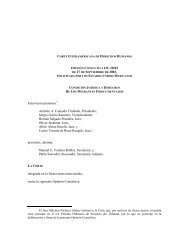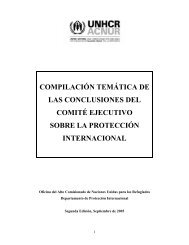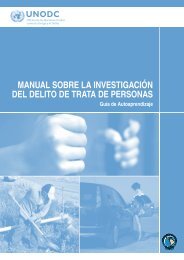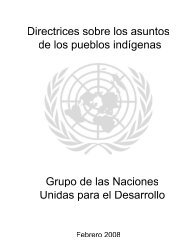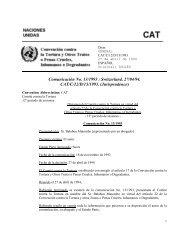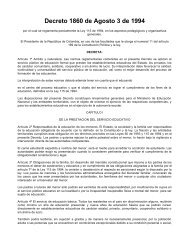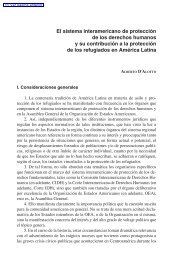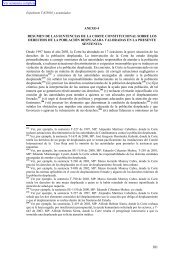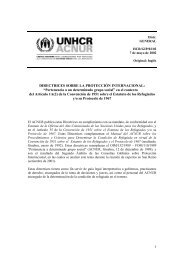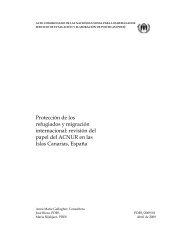Debates sobre los derechos humanos y el sistema ... - Acnur
Debates sobre los derechos humanos y el sistema ... - Acnur
Debates sobre los derechos humanos y el sistema ... - Acnur
You also want an ePaper? Increase the reach of your titles
YUMPU automatically turns print PDFs into web optimized ePapers that Google loves.
Gabri<strong>el</strong>a Echeverría<br />
Elizabeth Wilmshurst<br />
The prohibition of torture and ill-treatment<br />
Torture and other ill-treatment are prohibited in all the<br />
major international treaties dealing with civil and political<br />
rights, 10 by the four Geneva Conventions of 12 August<br />
1949 and their two Additional Protocols covering<br />
armed confl icts, and in national constitutions and domestic legislation<br />
throughout the world. Article 2(2) of the UN Convention<br />
Against Torture specifi es that “[n]o exceptional circumstances<br />
whatsoever, whether a state of war or a threat of war, internal<br />
political instability or other public emergency, may be invoked<br />
as a justifi cation for torture.”<br />
The prohibition of torture amounts to what is known<br />
in international law as ius cogens, or a “peremptory norm” of<br />
international law, which is binding on all States and to which<br />
no exception or derogation can be made even in times of war<br />
or public emergencies. 11 Both the Inter-American and the European<br />
Court of Human Rights confi rmed that the prohibition<br />
of torture is absolute. 12 13 In other words, the right not to be<br />
tortured cannot be “balanced” against other rights such as the<br />
right to security of others. This applies as much to times of<br />
armed confl ict as to times of peace, and to prisoners or war as<br />
to any kind of detainee.<br />
The “ticking bomb” scenario<br />
There is often discussion about the hypothetical situation in<br />
which the extraction of information from one person about how<br />
to defuse a bomb could save the lives of thousands. Is not an<br />
absolute prohibition of torture in such circumstances unrealistic?<br />
Arguments that there should be no justifi cation for torture,<br />
even in such circumstances, go beyond legal considerations,<br />
but include the point that even from a utilitarian point of view the<br />
”ticking bomb” justifi cation is weak, since torture rar<strong>el</strong>y extracts<br />
useful information –the evidence that it works is at best mixed.<br />
The argument is also forcefully made that torture is so inimical<br />
to the morality of our society, so damaging to the torturer as<br />
w<strong>el</strong>l as the tortured, that it cannot be allowed in any way that is<br />
morally consistent (B<strong>el</strong>lamy 2006).<br />
Obligations of States<br />
International law requires States to: abstain from conduct involving<br />
torture or inhuman treatment; to “take effective legislative,<br />
administrative, judicial or other measures” to prevent such<br />
conduct in their territory”; to investigate and prosecute such<br />
conduct, or to extradite the suspects to countries which will prosecute;<br />
not to use in proceedings information obtained by torture;<br />
not to deport, extradite or otherwise transfer a person to a country<br />
where he would be in danger of being tortured; and to afford effective<br />
remedies and adequate reparation to the victims.<br />
Measures to prevent torture and ill-treatment<br />
To achieve the eradication of torture and other forms of ill-treatment<br />
in practice, States must take steps to protect those in<br />
custody, since it is when persons are in the custody of State<br />
offi cials that they are most vulnerable. In particular, States must:<br />
train law enforcement and other personn<strong>el</strong> coming into contact<br />
with those in custody and review interrogation rules14 regularly;<br />
monitor “under systematic review” the effectiveness of measures<br />
to prevent torture or other ill-treatment such as regular<br />
inspection of places of detention; 15 and put in place “custodial<br />
10 The Universal Declaration of Human Rights of 1948; the International Covenant on Civil and Political Rights of 1966; the UN Torture Convention of<br />
1984; the European Convention of Human Rights; the American Convention of Human Rights; the African Charter on Human and People’s Rights;<br />
the Inter-American Convention to Prevent and Punish Torture; and implicitly by the European Convention for the Prevention of Torture and Inhuman or<br />
Degrading Treatment or Punishment.<br />
11 Prosecutor v. Tadic, Appeal on Jurisdiction of October 2, 1995. ICTY, IT-94-1-AR72,; See also the Human Rights Committee General Comment 20<br />
on Article 7 of the International Covenant on Civil and Political Rights. (Forty-fourth session, 1992), Compilation of General Comments and General<br />
Recommendations Adopted by Human Rights Treaty Bodies, U.N. Doc. HRI\GEN\1\Rev.1 at 30 (1994).<br />
12 See Caesar v Trinidad and Tobago, Judgment of March 11, 2005, Inter-Am. Ct. H.R. (Ser, C) No. 123 (2005).<br />
13 Eur. Ct. H.R., Case of Chahal v United Kingdom. Judgment of November 15, 1996.<br />
14 Article 10 of the UN Convention against Torture.<br />
15 Article 11 of the UN Convention against Torture.<br />
16 Principles 15-19 of the UN Body of Principles for the Protection of All Persons under Any Form of Detention or Imprisonment (GA Res. 43/173, 9<br />
December 1988); see also CPT, 12th General Report, the CPT Standards: substantive sections of the CPT's General Reports, CPT/Inf/E (2002) - Rev.<br />
2003, para.40.<br />
Inƒormación<br />
109 | AÑO II Número 3 | SEPTIEMBRE DE 2007


